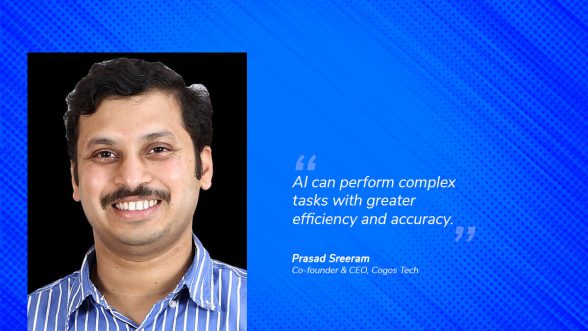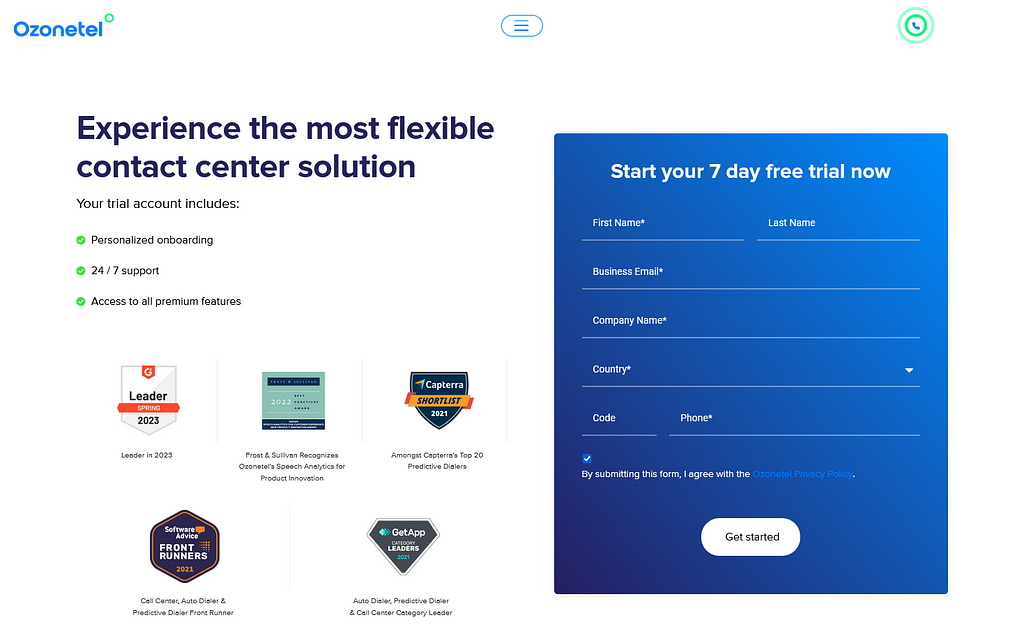- Resources
- Conversational AI can play a transformative role in the logistics space: Cogos Tech co-founder Prasad Sreeram
Conversational AI can play a transformative role in the logistics space: Cogos Tech co-founder Prasad Sreeram

No matter how great a product is, if it doesn’t reach customers when they need it most, it will hold little or no value and that’s what makes logistics integral to the day-to-day functioning of a business. Not only does it ensure that merchandise is delivered at the right time and place, but it also streamlines all the steps along the way. Last decade, the logistics space saw a massive uptick in technology adoption and demand for AI technology grew manifold. Mckinsey estimates that AI adoption in manufacturing and supply chain can help the industry generate up to USD 2 trillion a year in economic value.
To get a sense of the tech advancement in the logistics space, we got in touch with Prasad Sreeram, co-founder & CEO of Bengaluru-based enterprise logistics start-up Cogos Technologies.
In an interaction with Ozonetel, Prasad described Conversational AI as a transformative technology which can help streamline the overarching functions of the supply chain and logistics industry.
“It might look overwhelming at first as to where this technology will fit in our segment but if you break it down, AI can help overcome some of the key challenges faced by the logistics sector. It not only enriches customer experiences but can also perform devilishly complex tasks with greater efficiency and accuracy.”
Here is the transcript of our conversation with Mr Prasad.
In this article, we will explore:
- 1. City logistics is a highly fragmented and unorganized space. Please tell us about the major challenges you faced in your journey and how emerging technology helped you overcome those challenges.
- 2. Can deploying Conversational AI be useful for a company which is in the logistics and supply chain management space? Can you share the benefits of deploying this technology?
- 3. Please tell us about the AI tools you employed before the pandemic to engage with the customers, the impact of the pandemic and what has changed since then.
- 4. What, according to you, are the biggest advantages of deploying Conversational AI for customer services?
- 5. Consumers expect brands to show empathy and seek hyper-personalized services. What are the major challenges to personalization at scale and how does Conversational AI can help enterprises in this regard?
- 6. Besides customer support and engagement, what other tasks a Conversational AI or an AI-empowered chatbot can perform in an organization?
- 7. According to a Mckinsey report, at least one firm in every twenty suffers a loss of more than $100 million in a single year as a result of supply chain interruptions. What role can Conversational AI play in mitigating supply chain risks?
- 8. What suggestions would you give to a company that’s working to deploy Conversational AI for the first time?
- 9. Another important aspect of Conversational AI is voice technology. Voice-search queries have become very popular in India. AI-powered vernacular voice technologies are rapidly going mainstream but speech recognition implementation in real-time is still a big challenge. What are the key hurdles businesses face in adopting voice tech?
City logistics is a highly fragmented and unorganized space. Please tell us about the major challenges you faced in your journey and how emerging technology helped you overcome those challenges.
Intra-city or city logistics is a very fragmented segment. Nearly 90% of the trucks running across cities are owned by individual drivers. This makes the whole market very unorganized. Discovering the right capacity, right resources and streamlining the workflow become difficult and that’s where platforms like ours come into play. We not only onboard the truck drivers but also train them in different workflows ranging from e-commerce to FMCG retail or for simple end-to-end warehouse movements within the industry. And for enterprises too, it becomes easier because now they’re able to fulfill their logistic needs with just one single platform and this can be taken up across the country. If an enterprise is operating in multiple metro cities, they have to work with multiple vendors and the problem gets more complicated in Tier 2 or Tier 3 cities.
Operating with a large workforce without necessary logistics support is nearly impossible. So, a synchronous logistics mechanism is crucial to meet customer expectations. This is where Cogos plays a crucial role as a technology provider and a logistics aggregator.
Can deploying Conversational AI be useful for a company which is in the logistics and supply chain management space? Can you share the benefits of deploying this technology?
Absolutely, I totally believe that these technologies are very useful in logistics. So, if you treat logistics as one single unit, then probably it might look overwhelming where this Conversational AI will fit in. But let’s break it down to use cases in the logistics space.
To perform these tasks, they will have to call some person or dig into databases. These will need some level of intervention and that can be overcome through Conversational AI. We, at Cogos, are building an in-house Conversational AI workflow with the help of certain open source and other tools.
Please tell us about the AI tools you employed before the pandemic to engage with the customers, the impact of the pandemic and what has changed since then.
We have seen massive digital adoption during the pandemic. Not just AI, we have witnessed the adoption of other technologies as well. To share an example – after the lockdown was announced, the Karnataka government was trying to figure out how to deliver food and other essential items to those who need it but could not move out of the confines of home. On the other hand, farmers were struggling to make sure that their produce does not rot in the field and gets sold. To overcome this problem, government agencies like HOPCOM started purchasing from farmers directly. Trucks were used to move the produce to warehouses and then another challenge was to ensure last-mile delivery.
This is where Cogos came into play, we employed as many as 250 vehicles to help them with the last mile delivery. Had it not been for these AI-powered platforms, it would have been increasingly difficult to tackle these challenges right from identifying the vehicle owner to tracing the location. Be it routing, scheduling or discovery, the AI tools came in handy in all these use cases. All through the lockdown, we were able to provide fruits, vegetables, and essential goods through HOPCOM all across Bangalore. Cogos was the sole logistics partner of HOPCOM for the Farm-2-Consumer initiative at that time.
What, according to you, are the biggest advantages of deploying Conversational AI for customer services?
Conversational AI has taken many avatars. A couple of decades back, when speech-to-text tech was in its early days, the conversion was really poor because it’s complex. Each accent is different and the context of a word while being used in a conversation could be very different. Determining all that is really a science.
Conversational AI has evolved a lot with virtual assistants like Amazon Alexa, Apple’s Siri and Google assistant becoming increasingly popular. Today, we can build multiple AI applications and Conversational AI is one of them. By combining AI and natural language processing, we can create new solutions and Cogos will be at the forefront of this change in the logistics space.
Consumers expect brands to show empathy and seek hyper-personalized services. What are the major challenges to personalization at scale and how does Conversational AI can help enterprises in this regard?
There used to be a time when we were very worried about the whereabouts of our package in case of delay and had lesser avenues to know about the products we wanted to purchase. For queries regarding products, we were supposed to reach out to somebody and it started with customer care support. However, it has gone to the next level now. Now we have multiple options to understand whether it’s the right time to buy a product or whether it suits our requirements.
You can just optimize through AI and ask a question. You will not need human intervention for such queries. AI will pick your words, and their context and automatically answer and if domain expertise is needed, it will connect you with the human agent. So, that’s how Conversational AI has become very important whether it’s travel, hospitality, e-commerce or any other sector.
Besides customer support and engagement, what other tasks a Conversational AI or an AI-empowered chatbot can perform in an organization?
Business intelligence is an important aspect of Conversational AI. It’s not just about tracking a package or getting answers to simple queries. In fact, it can help you start a contract. So, rather than going through the entire ERP process, we can just ask the AI agent that I would like to start this. So, in the backend, we can structure all these complex routines with the help of AI and create this contract and keep it ready. Conversational AI can perform many complex tasks beyond product support or consumer support.
According to a Mckinsey report, at least one firm in every twenty suffers a loss of more than $100 million in a single year as a result of supply chain interruptions. What role can Conversational AI play in mitigating supply chain risks?
A: It’s not always a human error that leads to supply chain interruptions, there would always be situations that may require an entirely new approach. With improvement in technology, the number of errors has come down. Handling complex situations, and alerting the team’s office about the situation can be the next step for Conversational AI. So, rather than just user-initiated conversations, it could be the technology interventions triggering a conversation. And this can help bridge the supply chain gaps.
What suggestions would you give to a company that’s working to deploy Conversational AI for the first time?
A: Before deploying Conversational AI, I would identify the issue it is meant to address. Is it just a fancy thought or is it solving one of my major pain points? You must factor in the return on the investment before its deployment and what value it would bring to the business. We have been producing technology for the world but when it comes to consumption, we are late adopters because we only accept mature technologies, which are cost-effective and massively deployable. So, a technology which is successful in India, I’m 100% sure it would have a greater reach than others. So, I believe in the coming years, new-age technology, especially AI-powered tools, will become very important.
Another important aspect of conversational AI is voice technology. Voice-search queries have become very popular in India. AI-powered vernacular voice technologies are rapidly going mainstream but speech recognition implementation in real-time is still a big challenge. What are the key hurdles businesses face in adopting voice tech?
A: Firstly, the chat interface will continue to gain traction. Also, the hybrid approach which includes both menu-driven conversations as well as a natural conversation would also be popular. It’s very important because if a user does not get an adequate response through an automated chat despite asking the same questions, it would irritate him. That’s where voice-based conversation also comes in. It can enable people to express or say something which may not be expressed in writing.
Regarding the evolution of AI-powered vernacular voice tech, I would say, we all have our distinct voices and expressions and given the multitude of languages, it becomes highly complex and difficult. So, I would expect more research in this space because vernacular-based Conversational AI is going to be in high demand.
Ready to take control of your call transfer
experience for better CX outcomes?
Rakesh Kr Jha
Rakesh, a senior writer at Ozonetel, draws on his decade-long journalism career to write about techn...







